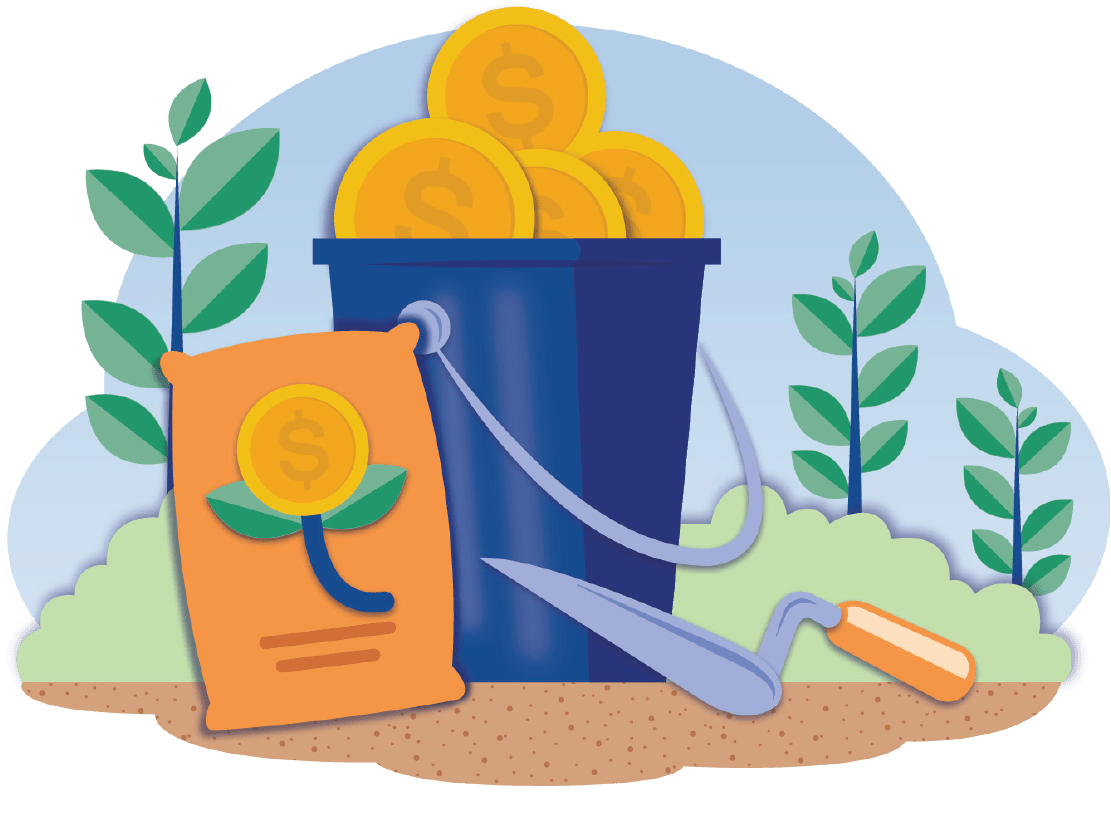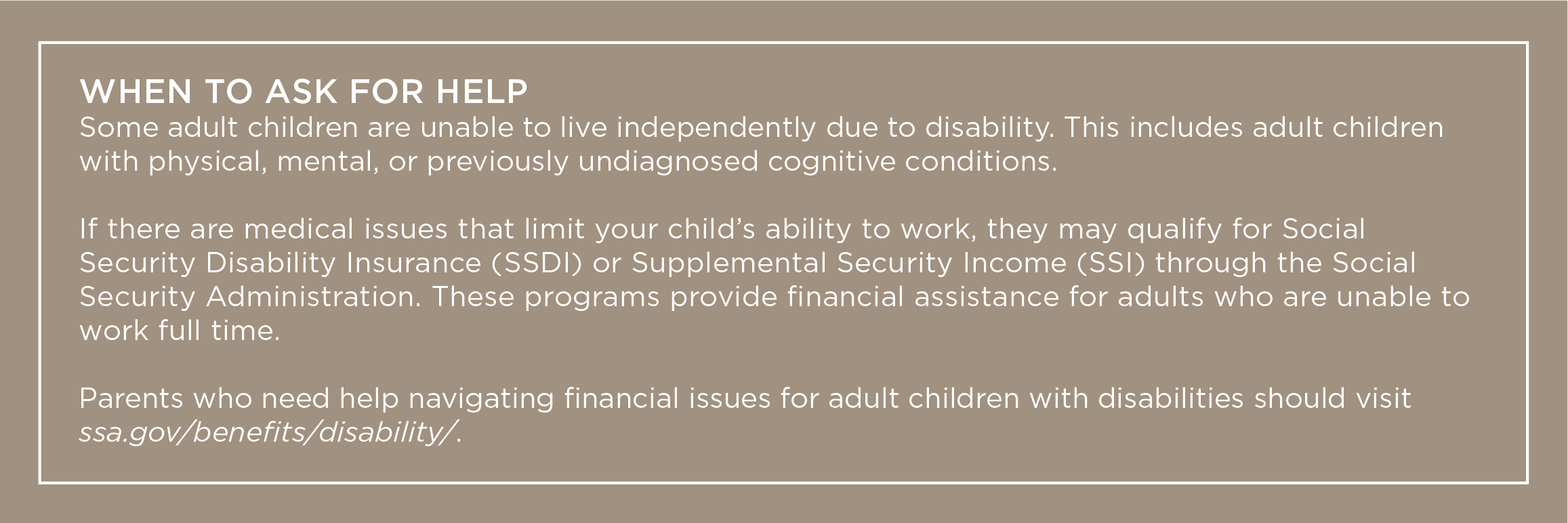Cultivating Financial Independence
According to a savings.com survey, 45 percent of parents with adult children provide financial support for at least one child, regardless of whether the child lives at home. Many of these parents are making significant sacrifices to help their children. They’re buying investment properties for their kids to rent at prices below market rates, withdrawing money from savings accounts to cover unexpected bills, and sending monthly allowances to help repay student loans.
The danger for some parents is that as their bank accounts dwindle, so do their chances of a secure retirement. In fact, the same study found that parents who are in the final decade before retirement are now providing the highest amount to their children—about $2,100 a month. The result: They’re depositing only $643 a month into their retirement accounts.
“As financial advisors—and fellow parents—it’s not our job to judge people for the way they spend their money,” says Joe Scarpo, a CAPTRUST financial advisor in Pittsburgh, Pennsylvania. “After all, it feels good to be able to provide for your kids. But if parents are risking their own financial health, it’s time to have an honest conversation.”

When Scarpo sees a client making poor financial decisions to support an adult child, “I try to explain to them, ‘It’s your choice if you want to continue allowing this. Just remember that if you go broke, then your kids will go broke too, because you’re helping them live a lifestyle they can’t really afford.’”
Breaking the Habit
If you’re a parent who has been providing regular financial assistance to adult children, the first step is to pause, step back, and ask yourself why. While the obvious answer might be because you love your children, for many it goes deeper than that.
Typically, the root cause lies in a parent’s own financial upbringing. Early money memories shape each person’s subconscious and emotional responses to financial decision-making. Many parents want to make things easier for their kids, helping them overcome small financial obstacles so they can go further in life. Others believe that providing lifelong financial support is simply a part of the job.
A 2021 research study from Stanford University, led by Associate Professor Jelena Obradović, showed that parents often assume their help will create better outcomes.
But in fact, parental involvement can be counterproductive, interfering with the child’s ability to practice self-regulation skills and build independence.
Once you have a grasp on why you want to support your adult children financially, you can make a more conscious decision about how to move forward.
This starts by taking a fresh look at your own financial picture. While there’s no specific age when children age out of needing financial support, there are thresholds beyond which parents might be putting their own financial goals at risk.
Understanding how much and how often you can give means considering factors like your retirement age, expected retirement income, lifestyle, and philanthropic intent. In the same way you might anticipate early retirement, extra healthcare expenses, or a market pullback in retirement in your financial plan, your financial advisor can help you model different giving scenarios.
This provides you with a more complete view of how gifts to your children can impact your future. Then you can adjust as needed. It also gives you guardrails to work within or may help you understand if you need to break the habit altogether.
Space to Grow
After years of help, some adult children develop a sense of entitlement to family money. Some may even believe they are not capable of solving financial problems on their own. As a parent, weaning them off support means resetting expectations for your relationship with each other and reteaching skills for financial independence.
Think of this process as tending a garden. By pulling out the weeds of entitlement, you create more space for good things to grow, including gratitude and independence. Over time, children learn how to cultivate their own financial wellness.

Here are a few first steps parents can take to reinforce financial lessons, build financial independence, and uproot entitlement in their adult children.
Tell financial stories. Talking about money can be uncomfortable. Even if you don’t want to share specific numbers, like your net worth or salary, personal anecdotes can help teach the importance of hard work, persistence, and frugality. Tell your children about some of the financial decisions you’ve made and the reasoning behind them. When did you start saving and investing? How much debt do you have? Did you get an inheritance from your own parents? What are some of the best—and worst—financial decisions you have made?
Acknowledge uncertainties. Make sure your children understand that your financial situation is not set in stone. Your assets, investments, and even your will could change, so they shouldn’t rely on your assets as a safety net. Instead, help them clarify their own financial goals and create steps to achieve them. Introducing your children to your financial advisor can be another helpful step, especially if you plan to leave an inheritance.
Consider trusts and family foundations. These entities can protect adult children from themselves and from others who might try to take advantage of them. Parents who are worried about an adult child’s financial behavior might want to explore trusts and family foundations as a safer way to leave behind assets while instituting limitations. Trusts can also keep money growing and reduce or eliminate estate and gift taxes.
Let them fail forward. It’s tempting to shield the people you love from their own financial missteps, but it’s important to let them experience the natural consequences of their decisions. These lessons will have a lasting impact and help shape their future relationship with money. Along the way, you can be there to offer guidance but don’t have to bear the burden financially. If you start to feel like you’re enabling bad decisions, trust your instincts and let your kids fail a little—or a lot. Mistakes are just another part of the learning process.
Other Ways to Help
Every parent-child relationship is unique, so the way that each parent chooses to support each of their children will be different. “Some people choose to help their children by giving them seed money to get started,” says Scarpo. “Others give financial help all along the way. And others choose to help their kids by making them earn everything on their own. All those people believe they’re doing the right thing for their children.”
In other words, there is no right or wrong way to help your children. But if you’re considering working extra years or dipping into retirement accounts to support them, it might be time to make a change. That way, when the time comes, you can both feel confident that they have what they need to bloom on their own.
